Primary navigation
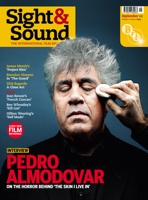
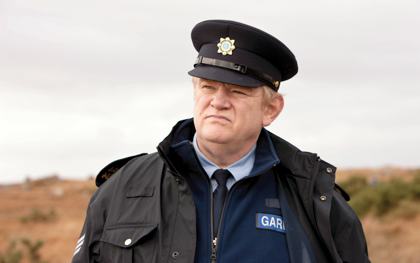
The economy may be shattered, but Ireland’s filmmakers continue to come up with the goods. Trevor Johnston surveys the current Irish scene
To begin, some Hibernian local colour. This is more of an apocryphal tale than anything specifically cinematic, but you’ll take the point. Picture the scene: weary English motorists, utterly lost in the wilds of Ireland, find themselves on some impossibly scenic, signage-free single-track road. Help is on hand, however, when they spot a horny-handed son of the turf by the wayside, roll down the window and ask for directions to their destination. Said local denizen gives the travellers a benign yet sceptical glance, scratches his head and tells them: “Ah sure now, you wouldn’t want to start from here…”
That’s a one-liner which sums up the current position of the Irish film industry. The country’s in economic meltdown. The home market can’t by itself support feature-film production. Finding finance from broadcast partners is near impossible in Ireland and almost as daunting abroad. So every single producer is reliant on the crucial contribution of Bord Scannán na hEireann, the Irish Film Board – the national film agency whose annual budget looks under threat as the government tries to meet its huge debt commitments. No, you definitely wouldn’t want to start from here…
In the meantime, though, the hits just keep on coming. Enjoyed at Sundance, Berlin and the Edinburgh opening night, John Michael McDonagh’s frolicsome Connemara cop movie The Guard (pictured at top) is exactly the sort of thing that Irish cinema does best. The inestimable Brendan Gleeson is in his pomp as the small-town constable cocking a snook at the criminal fraternity and his own superiors when a drug-smuggling investigation pairs his uniformed rebel with Don Cheadle’s strait-laced FBI investigator. Riffing on procedural and buddy-flick staples, its widescreen bogscapes and Calexico’s Morricone-influenced score remind us of the elemental moral verities of the Old West, while McDonagh’s deliciously piercing dialogue nails a modern Ireland in thrall to half-digested political correctness and glib TV-show buzzwords.
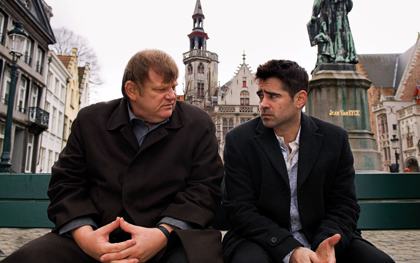
In Bruges
Actor-friendly, writer-led, bristling with attitude – and bloody funny to boot – it’s a film whose lineage can be traced back through several other defiantly Irish left-field crime pics. For starters, there’s the philosophical hitmen-abroad caper In Bruges, which showed lauded playwright Martin McDonagh (yes, the brother of The Guard’s writer-director John Michael) transferring his skills from stage to celluloid. Lagging behind is the admittedly somewhat strained gangland pile-up Perrier’s Bounty (in which writer Mark O’Rowe didn’t quite match the frisky insouciance of his 2003 tyro effort Intermission). Going way back to 1997, a time when there were few Irish films of any stripe, Conor McPherson’s knowing, absurdist, slow-burning screenplay for Paddy Breathnach’s I Went Down now looks like it set the template for what’s followed in offering a distinctive local spin on familiar US genre moves (and a great role for Gleeson). It also, moreover, set another acclaimed man of the theatre off on a subsequently bifurcated career path, as McPherson thenceforth divided his time between the Dublin/ London/Broadway stage and directing his own small-scale, intriguing and hard-to-classify films like Saltwater (1999) and The Eclipse (2009).
Factor in the sleeper success of John Carney’s loveable micro-budget muso romance Once (2007), and Lenny Abrahamson’s subtly devastating portraits of social outsiders in Adam and Paul (2004) and Garage (2007), and a wider sense of Ireland’s burgeoning filmmaking profile emerges. Indeed, the Irish Film Board stamp on such critical and cultural landmarks as John Boorman’s splendid true-crime shaggy dog story The General (1998), Peter Mullan’s affecting exposé The Magdalene Sisters (2002) and Paul Greengrass’s Bloody Sunday (2001) – the brilliantly mounted historical recreation that put his career on the path to Bourne sequels – confirms that here’s a cinematic nation definitely punching above its weight.
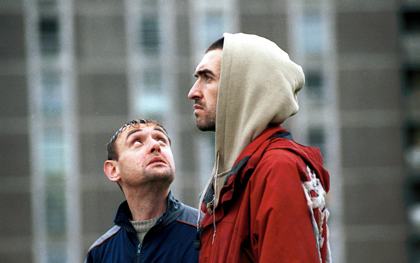
Adam and Paul
In terms of Irish filmmakers being able to pursue their vision on an international level, Neil Jordan and Jim Sheridan were evidently the pioneers. But the presence of invaluable state support – not to mention a pool of assured performers (including Gleeson, Colin Farrell, Gabriel Byrne, Cillian Murphy et al) – has helped make Ireland a distinctive player on the global film scene, where until the mid-1990s there was little resembling a film industry at all. The country’s recent fiscal calamities have seen a certain amount of derision visited on the home of yesteryear’s Celtic Tiger, but the filmmaking community continues to weather the storm, its confidence bolstered by the continuation of film-production tax breaks until 2015 and a cut of only 4 per cent off the Irish Film Board’s grant for 2011. Looking ahead to next year, well, nobody really knows…
As for what exactly ‘an Irish film’ might look or smell like, that’s another imponderable, though if you ask around, there’s definitely a sense that Irish cinema remains very much indie-focused and, in the broadest sense, a writerly affair, since it’s the likes of the McDonagh brothers, McPherson and O’Rowe who have garnered the attention of late. “We’re a loquacious people – our theatrical tradition reflects that,” avers stalwart Dublin-based producer Robert Walpole, who’s been working with McPherson since I Went Down. “The way we use the English language is very much our own – it’s something to do with those Gaelic constructions. So when we come to look at, say, the traditional American crime film, we can give it our own particular style. The next big thing for us is to take that a step further and fully embrace the fact that cinema’s a visual medium.”
In that respect, The Guard is certainly moving in a more cine-literate direction than its Celtic crime-pic forebears, thanks in no small part to a bold approach to colour in the production design and the care with which John Michael McDonagh arranges the Scope framing. McDonagh may be slightly sheepish (“This may sound really pretentious, but…”) when revealing that he pored over his Antonioni DVDs, plus John Ford’s Cavalry Trilogy and the Preston Sturges classics for their ensemble feel, before prepping the film with DP Larry Smith (who shot Eyes Wide Shut for Kubrick and Bronson for Nicolas Winding Refn). But he’s certainly bolshy when decrying what he sees as an alarming lack of directorial awareness and panache elsewhere in his countrymen’s cinematic output. “You’d think some of these people had never actually seen any great cinema before they went out and shot this stuff,” he fulminates. And just don’t get him started on Perrier’s Bounty…
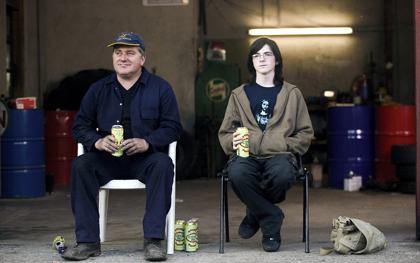
Garage
The exception in McDonagh’s eyes – and indeed for this writer the great Irish film of the century thus far – is Lenny Abrahamson’s Garage. Written by Mark O’Halloran, it’s the poised and compassionate tale of a slow-witted, lonely mechanic – brilliantly played by popular TV comedian Pat Shortt (he also pops up as a cowboy-hatted IRA functionary in The Guard) – whose longing to fit in with the everyday social interaction the rest of us take for granted eventually proves his undoing. Abrahamson’s 2004 feature debut, the Dublin junkie chronicle Adam and Paul (also scripted by O’Halloran), had an unsentimental empathy for those struggling to find their place in the world. Garage built on its strengths, crafting a genuine piece of European auteur cinema.
In fact, such is the regard in which Abrahamson is held by Element Pictures, the Dublin company involved in both his features to date, that producer Ed Guiney has formed a splinter operation, Element A, to develop projects solely for him – among them a murder story set in Dublin’s wealthy South Side (which could be shooting this winter), an arthouse comedy set in the world of avant-garde music (co-written by Jon Ronson and Peter Straughan) and Hunger scriptwriter Enda Walsh’s adaptation of Into That Darkness, Gitta Sereny’s examination of Holocaust culpability.
One would hope that the McDonagh siblings, Walsh and McPherson may still have their best film work ahead of them (and lets not write the cinematic obituaries for Messrs Jordan and Sheridan just yet). But from the present vantage point, it does seem as though the story of Irish cinema over the next few years may be shaped in part by the degree to which Lenny Abrahamson shifts up or down through the gears. Guiney describes him as a “once-in-a-lifetime talent”, a statement that almost automatically has one casting around for who else might be coming through, and wondering how they might be nurtured. In the commercial arena, the smart money is on duo James Mather and Stephen St Leger, who’ve been shooting the action thriller Lockout for producer Luc Besson in Belgrade, prior to completing post-production and CGI work on the Guy Pearce-starrer in Dublin.
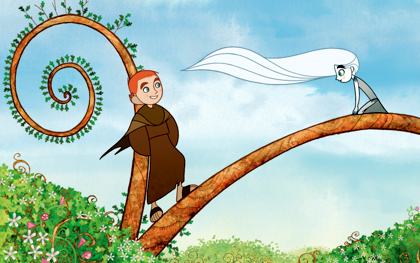
The Secret of Kells
They’ll no doubt be the first Irish talents since Dundalk-born John Moore (Behind Enemy Lines, the Flight of the Phoenix remake) to impact greatly on the multiplex mainstream, though from animation (Tomm Moore and Nora Twomey’s characterfully drawn The Secret of Kells) to the documentary fields (the gender portraiture of Ken Wardrop’s His & Hers; Risteard O’Domhnaill’s extraordinary vivid record of a small community taking on corporate oil in The Pipe), there’s evident endeavour in a variety of contexts. Juanita Wilson’s Bosnian-war drama As If I’m Not There and the recent splash made in the Cannes Director’s Fortnight by The Other Side of Sleep, first-timer Rebecca Daly’s brooding story of sleepwalking and murder in an Offaly village, also point to a welcome flourish of female directorial flair.
For now, the economic mayhem – and indeed the arrival of new chief executive James Hickey at the Irish Film Board (taking over from Europhile Brit Simon Perry) – have put the focus back on the centrality of the IFB and its support for the modestly budgeted independent dramas that are the Irish industry’s stock-in-trade. A cursory glance through the list of funding decisions posted on their website shows a steady flow of development grants and production coin to the major production-company players on the Dublin scene, whose output – all and sundry readily affirm – would simply be untenable without it. As Hickey’s deputy Teresa McGrane explains, the IFB is involved in many projects from the initial idea, through development, financing assistance and production support, to sales, festival and marketing strategy. “Without an agency like ours, which has the expertise and the financial resources to put this into action, local production absolutely wouldn’t happen,” she says.
Which means that all eyes are on their decisions. From those interested parties contacted in the course of researching this piece, there seems to be a groundswell of opinion that the IFB has been handing out cash too easily to projects that weren’t ready for primetime and had scant chance of connecting with the marketplace. “They funded 28 films in 2008!” exclaimed one independent producer, who wanted to remain anonymous. “There was never an audience for 28 Irish arthouse films in one year!”
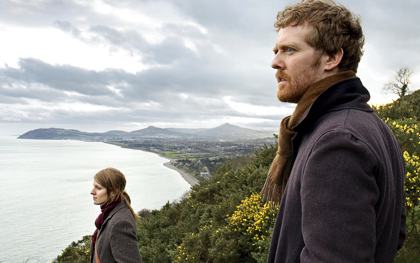
Once
To be fair, McGrane herself admits that 2008 was an exception that will never be repeated, but the much respected Ed Guiney (whose ambitious Element Pictures outfit has also co-produced the likes of Jerzy Skolimowski’s Essential Killing and Paolo Sorrentino’s recent Cannes contender This Must Be the Place) is willing to put his head above the parapet: “I might get shot for saying this, but I think the IFB has funded too many films in the past. I’d like to see them making fewer films and taking larger bets on the films that they do make.”
McGrane hints about “setting the bar higher”, suggesting that some policy adjustment may be in the offing, while also pointing to the tax-break extension and the IFB’s virtually unscathed budget for the current year as an indication that the battle for state recognition of the industry’s economic worth – and its arguably more intangible cultural worth – has pretty much been won. As Guiney puts it: “We’re not good at banking. We’re shite at property. We’ve fucked it up. But one of the things we are good at is culture. So let’s look after that and help it grow.”
“Back in the early 90s when I was starting out, the very idea that you could even make a film in Ireland was like a mad thought,” Guiney concludes. “But the ambition has moved on. It’s not just a matter of simply making films – we’ve got to be creating cinema which fulfils its ambition and knows who its audience is. We can’t sustain ourselves on the Irish market alone, so we have to be looking outwards. I used to say that the Americans all think we’re leprechauns, the Brits think we’re terrorists, but in Europe it’s like: ‘Aah, Samuel Beckett and James Joyce… Veeerrry interesting!’ Obviously, that’s where you want to be.”
‘The Guard’ is released on 19 August, and is reviewed in the September 2011 issue of Sight & Sound
His & Hers reviewed by Samuel Wigley (April 2011)
Essential Killing reviewed by Tony Rayns (April 2011)
The Wind That Shakes the Barley reviewed by Edward Lawrenson (July 2006)
I Could Read the Sky reviewed by Charlotte O’Sullivan (November 2000)
When the Sky Falls reviewed by Kevin Maher (July 2000)
Nora reviewed by Kevin Maher (June 2000)
Angela’s Ashes reviewed by Nick Roddick (January 2000)
Waking Ned reviewed by Kevin Maher (April 1999)
Man of Aran reviewed by Paul Rotha (Summer 1934)